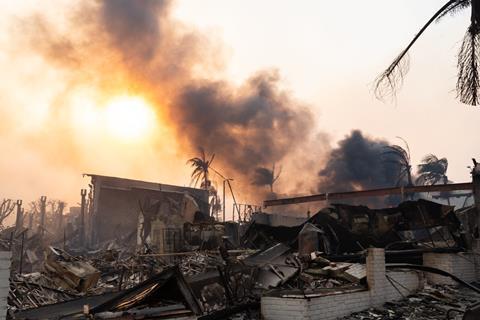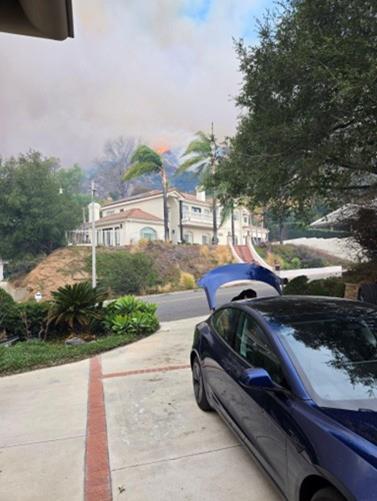Jacinta Read and her family have been evacuated from their home in Arcadia, Los Angeles, close to the Eaton Canyon wildfire. She shares their experience and calls for Christian charity and compassion in the face of apocalyptic devastation

I’m writing at a friend’s dining table, listening to the helicopters and sirens that have been the soundtrack to the last few days here in Los Angeles. The fires continue to burn, and our rented house on the edge of the Eaton Canyon fire is still under evacuation orders.
The apocalyptic devastation you glimpse on the news is real. Fires continue to rage all over LA and countless people have lost their homes, livelihoods and entire neighbourhoods. The rest of us continue to watch and wait. More high winds are forecast, so more bad news may be ahead. Regardless, the repercussions of the damage done will unfold for years.
We live about ten minutes away from Altadena, where, at the time of writing, the Eaton Fire has ravaged over 14,00 acres and claimed five lives. When our area was issued with a mandatory evacuation order, we were briefly allowed home to pick up a few essentials.
Returning home
As we drove uphill toward the fire, which was clearly visible, the air was thick with smoke. There were flames burning right across the street behind our neighbour’s houses and firefighters all around, but we were allowed to park in our driveway and run inside. For ten minutes, we loaded documents, medication, clothes and a few of our children’s favourite things into two cars.
My husband, Tom, and I both work for Vintage Church Pasadena. The air surrounding the church building is thick with ash and everything smells like a bonfire. We drove to the church and did our best to pitch in by organising call lists and assessing the needs of our community while also booking an Airbnb for our family. As time passed, we both noticed we were struggling to breathe. We all took in a lot of smoke back at our house, running around, packing and lifting things. Our eyes stung, my husband was coughing a lot and, in the rush, I sprained a finger.
There is no need to explain the reasons for what has happened. It helps to know the world is watching and cares
Comparing traumas is unhelpful, and avoiding it is another challenge this week. At the time of writing, we are still under a mandatory evacuation, but we are safe, our family is together, and we have our most important possessions. I’m painfully aware of the thousands of people who cannot say the same.
That night we watched the live news feeds, taking in the continuing devastation. I thought about those who are wheelchair users or need medical apparatus, have severe neurodivergence, the elderly, and those who are battling serious illnesses. It was surreal. Before moving our family to LA in 2022, we have lived in Hong Kong, Australia and England. We’ve never seen anything like this. It is hard to find the right words, but it is important to try.
A biblical response?

Is there an inherently Christian way to respond during a crisis? Of course, there must be. But how people interpret the Bible ranges widely, and there is no shortage of examples of Christians getting it wrong. When in doubt, the best and most immediate response to people in crisis is love, sympathy, concern and practical help. Surely.
Sadly, times like these can tempt some Christians to assign meaning or blame. The desire for certainty is a human tendency. We want to know why, how, and now what? While understandable, this can sometimes lead us to fill in the blanks with misguided statements like: “God must be punishing you/them/us”; “Maybe God needed to get your attention” or empty platitudes like: “God wouldn’t give you more than you can handle.”
None of us is privy to all of God’s plans. Careless statements may allow the speaker to sound like a faith-filled member of God’s inner counsel, but they can leave victims religiously gaslit, wondering about the nature of God. Please don’t do this. It is not helpful.
Christians don’t have the monopoly on this problem though. Watching the online chats on live newsfeeds, I’ve seen people battling over politics (local and international), climate change and social justice. It’s safe to say that no one is at their best right now. This also is worth keeping in mind: we humans tend to want to fill the silence, but few of us are able to improve upon it. Some will grab at any opportunity to draw attention to their own agenda. It is lamentable.
Lament is a biblical practice. Job lamented when he lost everything (his wife and friends were famously unhelpful) and the Psalms are full of examples of King David’s lament. Jesus had no trouble crying out to God at the end of his life when he felt forsaken.
Despite this, some Christians struggle to allow for negative emotions. Perhaps they fear the questions and doubts that often accompany them as signaling a lack of faith. The good news is: it doesn’t. Flannery O’Connor said there is “no suffering greater than what is caused by the doubts of those who want to believe”; that, in fact, doubt is “the process by which faith is deepened.”
Holding space
Having said this, it is important to remember not everyone reacts in the same way. We are seeing the full gamut of stress responses here: Fight, flight, freeze and fawn. There are regular people turning into superheroes, and usually competent leaders struggling to function. Some are in denial and others are planning for end times.
Although I know how I’d like to react (x-ray vision and super strength), in truth, I’m working with what I’ve got: mild exhaustion, an emotionally wobbly family, and a rental house still in harm’s way. I’m safe and I’m in shock. Both things are allowed to be true. This is what I would tell a friend. We can show Jesus-levels of love to ourselves and others by withholding judgement and working with the loaves and fishes at hand.
When in doubt, the best immediate response to people in crisis is love, sympathy, concern and practical help
This week, while thousands of people are facing unimaginable grief, let’s begin with the goal of causing no further harm. There is no need to explain the reasons for what has happened. It helps to know the world is watching and cares about what we are going through. Sometimes this is enough.
A level up from this is to show love and charity with no strings attached. Not everyone is ready or able to articulate their needs at this time. It is safe to assume the needs are plentiful and will grow. If you want to contribute financially, many organisations, including our church, have relief funds.
We are grateful for the concern and support pouring in from all over the world. The number of people showing up with donations, money, and various other offers of help is humbling and enough to restore one’s faith in humanity.
Sitting in uncertainty is uncomfortable. For those facing a natural disaster of this magnitude, that’s a mild way to put it. May we hold space for ourselves and one another, work hard to minimise further distress, and pray. Pray for those courageous firefighters, for decision makers, those who are grieving their losses, and pray for favourable weather. God have mercy.




































2 Readers' comments